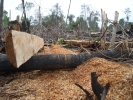 Indonesia is allowing powerful businessmen to get rich from smuggling rare timber to China despite its pledges to crack down on illegal logging and preserve its forests. An undercover probe by the independent Environmental Investigation Agency (EIA) and local NGO Telapak found rampant smuggling of merbau, a valuable hardwood found mainly in Papua.
Indonesia is allowing powerful businessmen to get rich from smuggling rare timber to China despite its pledges to crack down on illegal logging and preserve its forests. An undercover probe by the independent Environmental Investigation Agency (EIA) and local NGO Telapak found rampant smuggling of merbau, a valuable hardwood found mainly in Papua.
The probe tracked the routes of illicit trade from the forests to the ships where the wood was being illegally exported, mainly to China and Singapore, as well as Surabaya, Makassar and Papua in Indonesia, with the help of corrupt officials.
Merbau is a valuable hardwood used to make flooring, furniture and doors. Within Indonesia, almost all merbau trees are found in Papua in the east of the country. Papua's forests form part of the last significant tract of intact tropical forests in the Asia-Pacific region. About a quarter of Papua's forests have gone in the past 12 years.
Following the October 2009 seizure in Jakarta of 23 containers of merbau logs destined for China, India and South Korea, EIA/Telapak investigators posing as timber buyers uncovered a smuggling operation headed by Hengky Gosal which employed bribery and exploited failings in the monitoring system to acquire documentation for the shipment.
While unwittingly speaking with investigators, Gosal admitted smuggling up to 50 containers a month of merbau square logs (called flitches) to China, in contravention of Indonesia's log and sawn timber export bans. He also claimed to bribe customs officers to ensure safe passage out of Indonesia.
Another illicit timber trafficking hotspot is the city of Surabaya, in East Java, the base of operations for prominent merbau smuggler Ricky Gunawan. EIA and Telapak have submitted several reports on his activities since 2007 to Indonesian authorities, but he has yet to be investigated; as recently as December 2009, he was still shipping illegal merbau flitches to southern China.
Utilising a variety of methods to circumvent the authorities, Gunawan wields such influence that when one of his China-bound merbau shipments, falsely purporting to be "bridge components", was detained by Indonesia customs in April 2009, swift intervention on his behalf by some government officials and members of local parliament ensured the timber was released for onward shipment.
Complaints to authorities about the two alleged kingpins in the trade had achieved nothing, the groups said: "while the huge quantity of illegal timber flowing from Indonesia during the first half of the decade has declined, effective law enforcement against those responsible -- the financiers, company bosses and corrupt officials -- has been woefully inadequate," EIA campaign director Julian Newman said.
The groups called on Indonesian President Susilo Bambang Yudhoyono to make good on his promises to crack down on what he has called the "logging mafia" that is accused of destroying much of the country's pristine forests.
Indonesia is one of the world's biggest emitters of greenhouse gases blamed for global warming, mainly through deforestation.
Yudhoyono has pledged to slash its emissions by more than 40 percent over 2005 levels by 2020, as long as foreign donors pour billions of dollars into the country for forest preservation.
"It is time for Indonesia to redouble its efforts to combat timber smuggling by going after the main culprits. The illegal trade of merbau is symptomatic of the wider problems and the governance failure in the forest sector in Indonesia - added Telapak representative Hapsoro - It is not only the problems of Indonesia. China has been wide open to illegal timbers. We hope China will follow the US and the EU in banning illegal timber in a bid to protect forests."


